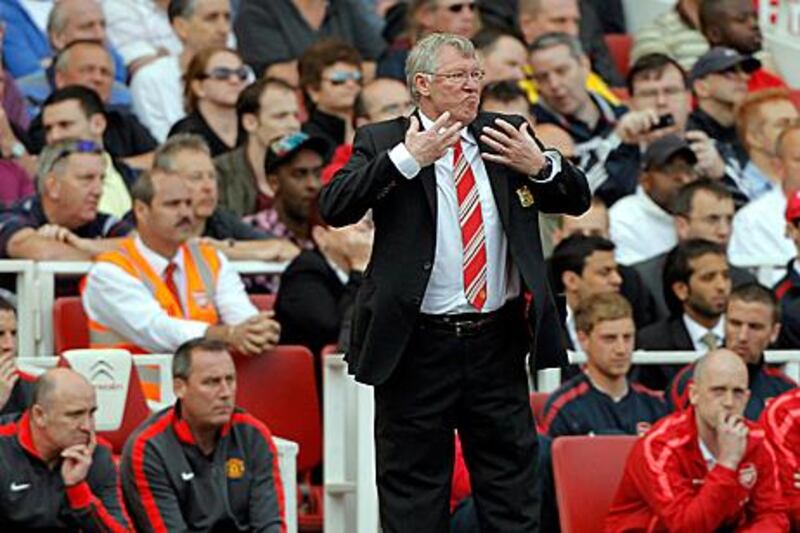And the award for the weekend's premier Jose Mourinho impression goes to (drumroll please) ... Sir Alex Ferguson.
Substitute the familiar Glaswegian groaning for the Portuguese's strangely Slavic accent and the sentiments are shared between Madrid and Manchester.
"We're not going to get the decisions in these big games, I'm afraid," the Manchester United manager said after Sunday's 1-0 defeat at Arsenal.
And why not? Ferguson, unlike Mourinho, did not fully elaborate.
Yet such comments invariably suggest a paranoia. Ferguson can speak with the fervour of a conspiracy theorist, plucking facts that support his case and ignoring those that don't.
Yet the questionable nature of both Chelsea's goals in Saturday's win over Tottenham Hotspur - Frank Lampard's effort never crossed the line, while an offside Salomon Kalou scored the winner - ignores the random nature of mistakes.
This was not a glorious weekend for the refereeing fraternity, even if excellent officiating, such as Kevin Friend's decision to dismiss Birmingham City's Craig Gardner for diving, gets swiftly forgotten among the outcry.
However, a particularly selective interpretation of events is required to argue that United were penalised on Sunday.
Yes, Gael Clichy's late foul on Michael Owen should have resulted in a penalty; so, too, should Nemanja Vidic's flying, first-half handball.
Perhaps Ferguson would have preferred a 2-1 defeat, with the possibility his captain would have been sent off and suspended for Sunday's game against Chelsea. It seems unlikely.
Human error, however, is not as juicy a premise as bias. Ferguson has already served a five-match touchline ban for suggesting referee Martin Atkinson was not fair in the March defeat against Chelsea at Stamford Bridge.
One of his favoured euphemisms, one which does not attract the attention of the English Football Association's disciplinary panel, is to call for a "strong" referee.
Quite how it is a sign of weakness to rule against the most powerful manager of his generation and one of the biggest clubs in the world is something he has never fully explained.
Moreover, while the cliche that decisions even themselves out over the course of a season can be disproved, there are reasons to believe luck has favoured United on plenty of occasions. While Vidic and the already booked Fabio da Silva, for a show of petulance, were spared red cards at the Emirates Stadium, they joined a long list.
Gary Neville should have been sent off twice, in the first half of the 2-1 wins at Stoke City and West Bromwich Albion, while Wayne Rooney's seventh-minute elbow on Wigan Athletic's James McCarthy ought to have brought the same sanction.
A wild challenge could have brought Rafael da Silva's early departure against Liverpool, Paul Scholes courted an injury-time expulsion against Arsenal in the FA Cup and Vidic somehow dodged a second yellow card at West Ham United, Ferguson's side, losing 2-0 at the time, then subsequently rallied to win 4-2.
As four of those incidents occurred at comparatively early stages of away victories, a reasonable hypothesis is that, with different decisions, United would not be remotely as well positioned in the Premier League. It is something Ferguson tends to conveniently ignore.
In the interests of balance, it is worth recording that, within the space of a week, Chelsea's David Luiz and Liverpool's Jamie Carragher were particularly blessed to complete their respective defeats of United. Ferguson's mental ledger is more likely to document other fortunate escapes of opponents along with the penalties his side weren't given.
But those who attempt to control not only their only destiny, but that of all they encounter, are not best placed to appreciate the slings and arrows of outrageous fortune.
Rather, they prefer to throw accusations of their own, but the blame game would have rather more credibility if its participants were less one-eyed.
>>>
Another aspect of United's defeat at Emirates Stadium is that Ferguson wanted to sign Aaron Ramsey, the eventual match winner.
That the Welshman opted for Arsenal was partly because United planned to loan him back to Cardiff City for a year whereas Arsene Wenger, with his trademark belief in youth, wanted the midfielder in his first-team squad straight away.
Wenger's philosophy has been criticised often of late, but Sunday was a day when it was justified.
>>>
April 30: remember the date. Eight-and-a-half months after the season's start, someone finally kept a clean sheet at Bloomfield Road. Two teams, to be precise: Blackpool and Stoke City.
Besides the statistical curiosity, the greater significance lies in another squandered opportunity for Ian Holloway's team.
It was a fourth successive home game, the last three (against Wigan, Newcastle United and Stoke) looking potentially winnable.
Their remaining three fixtures include trips to Tottenham and Manchester United, sandwiching Bolton Wanderers' visit to the Fylde Coast.
Should they go down, the uncharacteristic failure to score against Stoke will appear especially costly.
>>>
Liverpool's 3-0 victory over Newcastle lifted them into fifth place, their highest position of the season and, while Luis Suarez illuminated Anfield again, there was another quiet reminder of Dirk Kuyt's role in their revival under Kenny Dalglish.
The Dutchman does not have the stardust that Suarez, Andy Carroll, Steven Gerrard and Raul Meireles possess, but their combined return under Dalglish is 10 goals. Kuyt has managed as many on his own.






